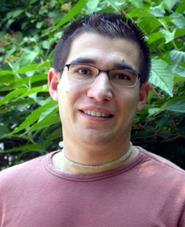
Jason Hecht '06 (Chestnut Hill, Mass.) has money on his mind. Rather than planning strategies to earn money following his upcoming graduation from Hamilton, Hecht is thinking about money in a different light this summer. As a Levitt Fellow he will be studying the future of the European Monetary Union with Alan Cafruny, The Henry Platt Bristol Professor of International Affairs.
When applying for the Levitt Fellowship this past February, Hecht initially proposed a project focusing on the implications and potential consequences of Germany's defection from the Stability and Growth Pact (SGP). While negotiating the SGP this spring, after Hecht had already written and submitted his proposal, Germany vetoed it. Consequently, Hecht changed his focus and is now studying Italy, France and Germany in relation to the European Union (EU) and is evaluating the economic futures of these countries.
"I'm still looking at the stability pact, and looking at what that's going to mean for the European Union," Hecht explained. He added, "Europeans have a very negative view of the EU right now, even though there were thoughts of the EU challenging the U.S. as an international power, and now, Europeans are rejecting the idea that they are part of the EU."
Hecht said that studying the EU as an outsider, from the vantage point of the U.S., is much different than actually being a part of the EU, because he has a much different view from the majority in Europe. "Many young people have lashed out at the EU, which I think is interesting," he said. "I think of the EU as being progressive—I guess it's different looking at it over here versus living over there and being unemployed."
Hecht, a double major in economics and world politics, said that he plans to go into economic consulting or international consulting after graduating from Hamilton next spring. He described his enthusiasm for his Levitt project, "I really like looking at economic markets and currency markets. What I like about what I'm studying now is that it's economics with a political background, and I enjoy learning about the two together. You've got to look at it both ways, from an economic viewpoint and a political viewpoint."
After the 10-week summer Levitt Fellowship, Hecht plans on turning his research into a senior thesis, which he will work on throughout the year, as more information about his study is released.
Regarding the opportunity to be a Levitt Fellow, which provides a weekly stipend to each student participating in the program, Hecht said that being able to focus all his time throughout the summer on his research and preparation is something that he has not been able to experience throughout the demanding school year. "Professor Cafruny has really guided me, and I like the idea that this is my project, I designed it, and since I changed it around a bit, I have found this even more exciting."
To enhance student research around issues of public affairs, the Levitt Center funds student-faculty research through its Levitt Research Fellows Program. The program is open to all students who wish to spend the summer working in collaboration with a faculty member on an issue related to public affairs.
Students receive a summer stipend and some expense money, and spend 10 weeks in the summer working intensively with a faculty mentor. Those selected for the program are required to provide a written assessment of their work at the completion of the summer, and also give a public presentation of their research findings to the Hamilton community, or local high school classes through the Levitt Scholars program.
-- by Katherine Trainor
Posted June 27, 2005
